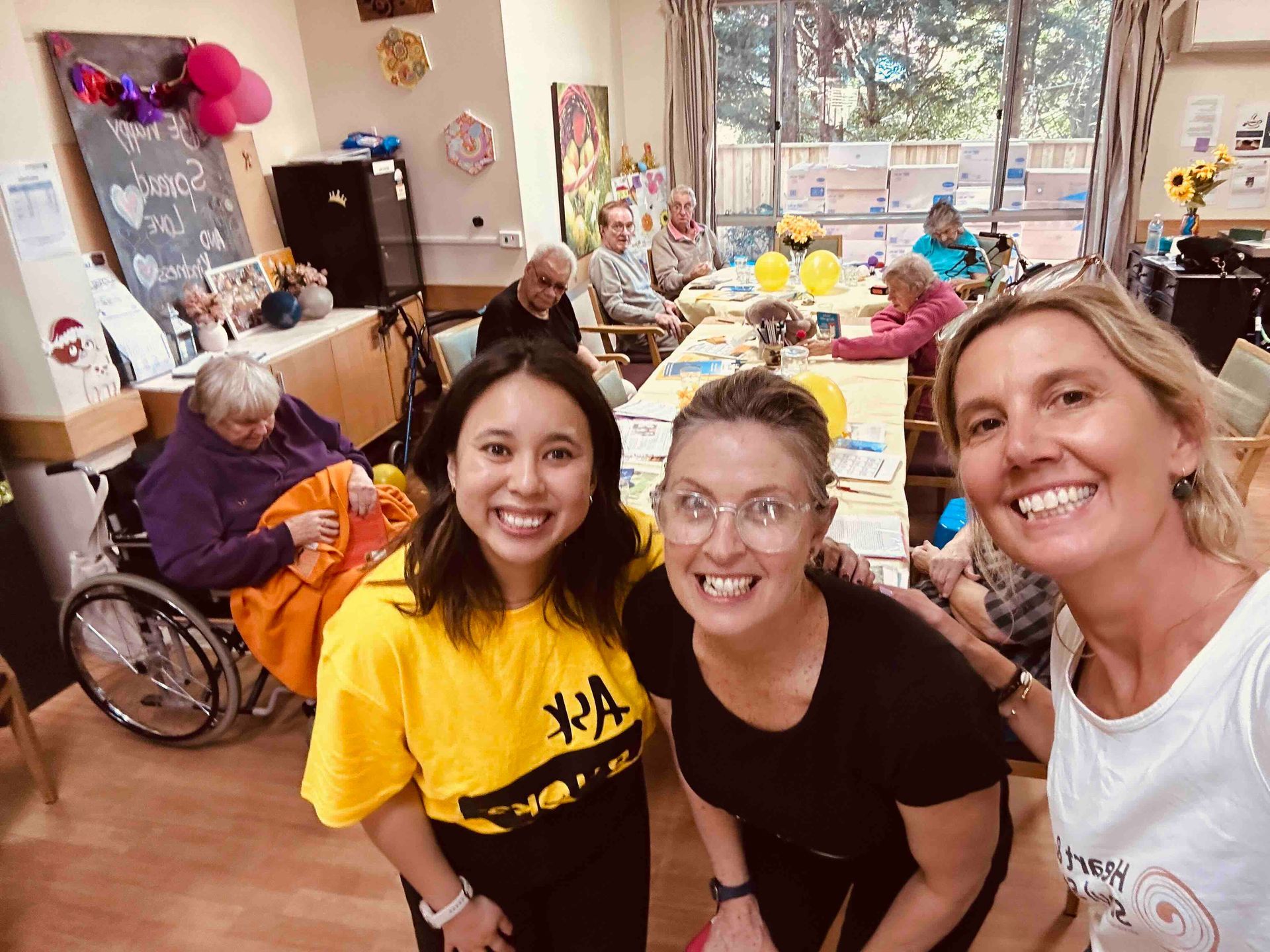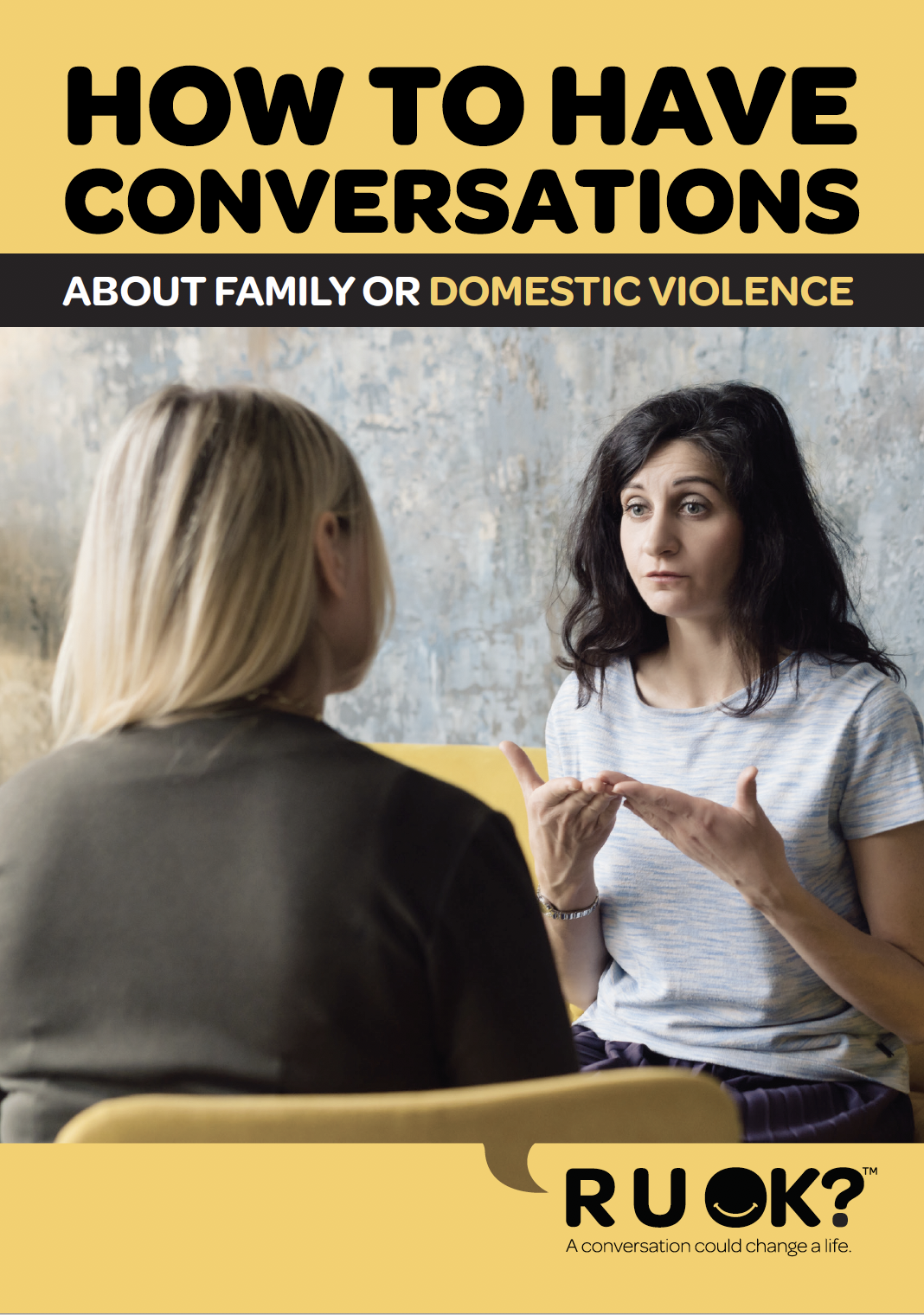How to have conversations about family or domestic violence
For help:
In an emergency, call 000.
1800RESPECT (1800 737 732): National Sexual Assault, Family and Domestic Violence Counselling service for anyone living in Australia who has experienced, or is at risk of experiencing, family and domestic violence and/or sexual assault. Available 24 hours a day, 7 days a week, by phone and web chat.
Men's Referral Service (1300 766 491): This service from No to Violence offers assistance, information and counselling to help men who use family violence.
Mensline Australia (1300 78 99 78): Supports men and boys who are dealing with family and relationship difficulties.
Practical Guide
This practical guide has been developed in collaboration with 1800RESPECT to help you spot the signs and start a conversation with someone you think might be a victim of family or domestic abuse. By making time to meaningfully reach out and offer support, you could change, or even save, a life.
Spotting the Signs
If someone is being impacted by abuse, you might notice that:
- They become more withdrawn and stop going out and spend less time with friends and family.
- They’re worried about making their partner angry and make excuses for the partner’s negative behaviour.
- They’re focused on timeframes that revolve around the partner. For example, they’re fixated on getting home because their partner is due home soon.
- They seem scared or wary around their partner.
- They may feel that they are being watched or followed in some way.
For the person using abuse or violence, it’s often subtle things that indicate an unbalanced level of power and control in the relationship. You might notice that:
- The abuser may act in ways that make the other person scared.
- They get very angry when the other person doesn’t follow their wishes.
- Their conversations with their partner will often revolve around control of their partner.
- They may use threats or put-downs to intimidate and control their partner.
What should I do?
If you’re concerned about what’s going on in someone else’s relationship, the first step is to call 1800RESPECT. You can talk to a trained counsellor about a strategy to intervene in a way that’s safe for you and other people in their family. They can also talk about strategies to help you get through to the person who’s being abusive in a way that doesn’t make them defensive
Tips for talking to someone who may be using abuse or violence in their relationship
How to talk to someone who is behaving abusively
Every situation is different, and that’s why calling 1800 RESPECT is an important first step.
How you approach the conversation depends on the situation; your relationship with them; the level of safety; and how they might react when they’re challenged.
If you decide it’s safe to talk directly to that person, and they are calm, there are a few things you should consider:
- Pick a place away from interruptions and where you won’t be overhead.
- Open up the issue in a non-confrontational way that won’t make them defensive, that shows you want to understand their perspective.
- Be open and transparent about what you have seen, and let the abuser know you are worried for their partner and children.
- Be non-judgemental in your language, and also be clear to the abuser that everyone has responsibility for their own actions
- Let them know that it can be better than this (See also NTV.org.au) and that there are help programs available
What can I say if they deny the abuse?
People will often deny using abuse or controlling tactics in their relationship. You might get a response like “You don’t know what you’re talking about,” “That’s wrong”, or “You should see what he/she does”. If they deflect the issue, listen to what they have to say and continue to hold your healthy boundaries on what is safe and appropriate behaviour in any relationship. Reinforce your impartiality by saying something like: “That’s not what I’m observing. What I’m seeing is this and this.” Refer to a specific behaviour you’ve observed and tell them it looks like controlling behaviour.
What if I’m wrong?
In most cases, by the time we’re ready to have a conversation with someone we suspect is being abusive, the abusive behaviour in the relationship may have already escalated. Therefore, respond to their denials by being clear about what you’ve observed and that concern for them and their relationship has prompted you to start the conversation.
How do you help them to change their behaviour?
Encourage them to call an appropriate support or counselling service. These services can help them understand why they need to control and dominate others. The counsellors can also help them identify strategies to deal with their day-to-day relationships and change their ways. Services you can suggest include:
- 1800RESPECT (1800 737 732): 24/7 counselling, information and referrals for sexual assault, domestic and family violence.
- Men's Referral Service (1300 766 491): This service from No to Violence offers assistance, information and counselling to help men who use family violence.
- Mensline Australia (1300 78 99 78): Supports men and boys who are dealing with family and relationship difficulties.
How to talk to someone who may be experiencing family or domestic violence
What can I do to support someone I believe is experiencing family, intimate partner or domestic violence?
The first step is to ring 1800RESPECT (1800 737 732): and have a chat to the counsellors about what options would work best for the situation. They can talk you through potential referral pathways; what police might be able to do; and services and stay at home assistance available in their area.
How should I start a conversation with the person experiencing abuse?
Preparing for the conversation:
- Choose the right place. Somewhere private, where the offender has no way of knowing the conversation has taken place. If the person has children, try to ensure the children are not around during the conversation. Choose somewhere no one can see them, so they are not ashamed or made to feel they must hide or suppress their emotions.
- Understand your role is to listen and not to shame them. People in these situations might feel ashamed or guilty and have been told by their partner that they are to blame. Try and understand what their frame of mind might be.
Starting the conversation:
You can start the conversation in several ways. Choose whatever is most appropriate for the relationship you have with the person:
- Raise it in a third-party way by saying: “I saw a story about domestic violence the other day and they said [insert what you heard/observed].”
- By directly referencing behaviour you have witnessed: “I heard the way they spoke to you the other day. It upset me because that’s not who you are or how you are. Is there anything I can do to help?”
- After opening up the conversation, pause a moment, let them speak and listen to what they say.
- Use ‘Active Listening’ where you are listening to understand, rather than listening to reply.
There are three key things to communicate during the conversation:
- Let them know you believe what they’re saying, and you’re concerned for them. Don’t question what they are saying. Don’t ask ‘why’ questions because these questions imply blame.
- Remind them that what’s happening is a crime, it’s not their fault, and it’s the offender’s responsibility. It can be helpful to ask what advice they would give their best friend if their friend was in their situation. Let them know that this gives them a different emotional perspective.
- Really get across that you’ll do whatever you can to help. Let them know what services are available. You can say something like “I’m happy to meet up whenever you want to have a chat” or “Let’s think about a safety plan”.
Understand what their reactions might be and how you might respond to them:
- Defensiveness and denial are common responses because the offender consistently blames them for the abusive behaviour.
- They might be afraid because of the constant hurt, humiliation, domination and control.
- They might burst into tears and say: “Go away! Leave me alone. It’s my problem.”
- They might be looking around furtively to make sure the offender can’t see them.
Always end the conversation with something open-ended that doesn’t shut the conversation down. If their response is “No, everything is fine”, leave the conversation with something like, “If there’s ever anything you need, give me a call” or “There’s this great organisation, 1800RESPECT. Why not give them a call? You can stay anonymous and just ask questions.” Another way to leave the conversation is: “If anything changes, I’m always here for you - for a chat or whatever you might need.”
What if they aren’t ready or in a position to leave the abusive relationship?
One conversation is unlikely to convince them to leave the relationship. Leaving just isn’t that easy. Rather, they’re likely to make multiple attempts before they leave the relationship for good.
There’s a considerable grooming process that takes place in domestic violence. The person experiencing it is gradually made to believe it’s their fault and they’re the one who is responsible. It can be difficult to turn that thinking around and recognise that what they’re experiencing is domestic violence. They could also have other concerns like leaving the community or town they grew up in, financial issues, or accommodation issues.
That’s why calling 1800 RESPECT is so important. They can give you specific advice on how to support them.
How often should you broach the subject?
The frequency will depend on how the first conversation went. It could be an ongoing conversation over a period of time, or it might be something that doesn’t happen again for another few months. It could even much later the person who’s experiencing violence turns up on your doorstep because you’re the only person who has been kind and supportive of them.
Make sure you look after you as well
How do you look after yourself when supporting someone else?
It’s important to counterbalance the trauma you witness or hear about. The following steps can help you look after yourself.
- Do something calming: Go for walk, listen to music, read a book, swim or take a bath.
- Creative pursuits: Do something creative that brings you pleasure and reminds you that the world isn’t filled with bad people. You could do some cooking or gardening.
- Debrief: You can call 1800RESPECT and debrief with one of their counsellors. It’s important you don’t debrief with anyone else to respect their confidentiality and safety.
For help:
In an emergency, call 000.
1800RESPECT (1800 737 732): National Sexual Assault, Family and Domestic Violence Counselling service for anyone living in Australia who has experienced, or is at risk of experiencing, family and domestic violence and/or sexual assault. Available 24 hours a day, 7 days a week, by phone and web chat.
Men's Referral Service (1300 766 491): This service from No to Violence offers assistance, information and counselling to help men who use family violence.
Mensline Australia (1300 78 99 78): Supports men and boys who are dealing with family and relationship difficulties.






















